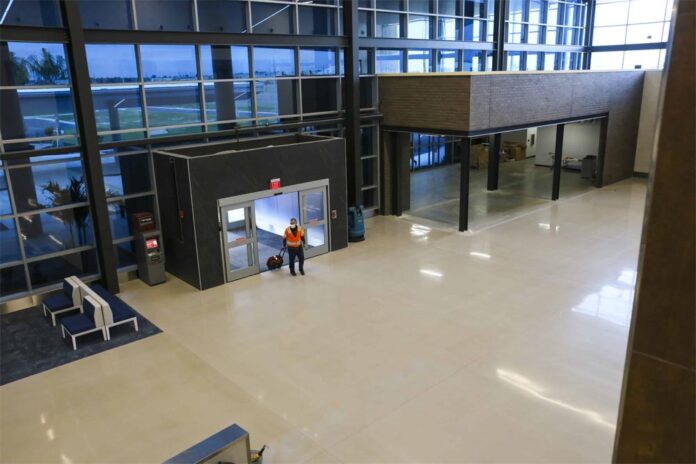
Major telecoms AT&T and Verizon put an emergency stop to deploying 5G near some U.S. airports, as many international carriers canceled flights to the country or changed the planes they normally use due to safety concerns about the 5G rollout.
So far, flights in the Rio Grande Valley do not seem affected by the cancellations.
The only cancellation of a Valley flight Wednesday was American No. 3167 from Dallas which had been scheduled to land at Brownsville-South Padre Island International Airport shortly after midnight. The cause of the cancellation is not known.
The Federal Aviation Administration issued an alert to airports Tuesday afternoon, announcing AT&T and Verizon had agreed to delay start-up of 5G towers near critical airport facilities.
“We recognize the economic importance of expanding 5G, and we appreciate the wireless companies working with us to protect the flying public and the country’s supply chain,” said Transportation Secretary Pete Buttigieg as quoted in the FAA memo. “The complex U.S. airspace leads the world in safety because of our high standards for aviation, and we will maintain this commitment as wireless companies deploy 5G.”
Recently the FAA released a list of 50 airports that the telecoms had agreed to temporarily postpone activating nearby 5G towers. Seven of those are in Texas, including McAllen-Miller International Airport.
“Most of those facilities looked like they were embedded inside city residential areas or city limits,” Marv Esterly, director of aviation at Valley International Airport, said Wednesday. “My guess is that they were close to cell phone towers, 5G cell phone towers that were proposed by the telecommunications companies.”
The issue involves the proximity of the 5G C-Band frequencies, which operate in the 3.7 gigahertz to 3.98-GHz range, and aviation equipment operating in the 4.2 GHz to 4.4 GHz range.
Airline passenger planes use their frequencies for radio altimeters, which provide height readings, as well as navigation and collision avoidance systems. These are particularly vital during weather-created, low-visibility landings.
5G C-Band interference could prevent engine and braking systems from transitioning to landing mode, which could prevent aircraft from stopping on the runway, the FAA said.
“I think when you’re talking about flight safety, I don’t know if you ever could have an ‘overabundance’ of caution,” Esterly said. “There’s no doubt the 5G signal, the frequency, is really close to those frequencies used by aircraft to tell their distance to the ground. That becomes very crucial during landing, and particularly in inclement weather.”
It wasn’t clear why some of Europe’s biggest passenger airlines swapped out their usual plans for the flights to the United States that were not cancelled. Some experts believe newer aircraft with updated equipment may not be as vulnerable to any potential 5G frequency drift.
On Wednesday, Emirates Airlines announced it would halt flights to several American cities due to “operational concerns” associated with the 5G deployment.
Tim Clark, president of Dubai-based Emirates, was particularly incensed by the situation, the Associated Press reported. He told CNN it was “one of the most delinquent, utterly irresponsible” situations he’d ever seen as it involved a failure by government, science and industry.
Japan’s All Nippon Airways said it canceled some flights and swapped airplanes on others. British Airways and Air India also canceled flights, but Air France said it was continuing flights as usual with its regular planes.



